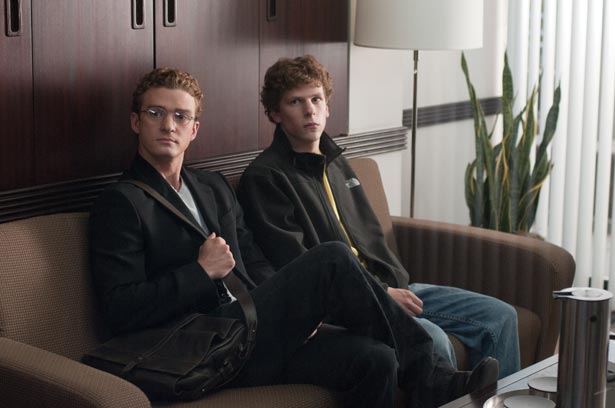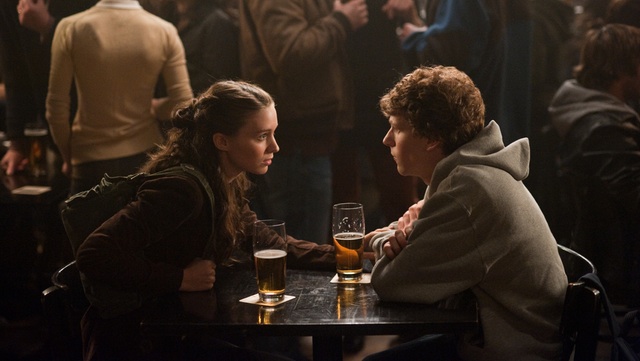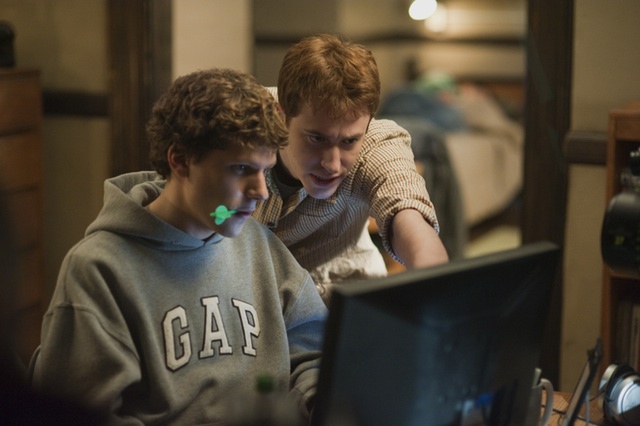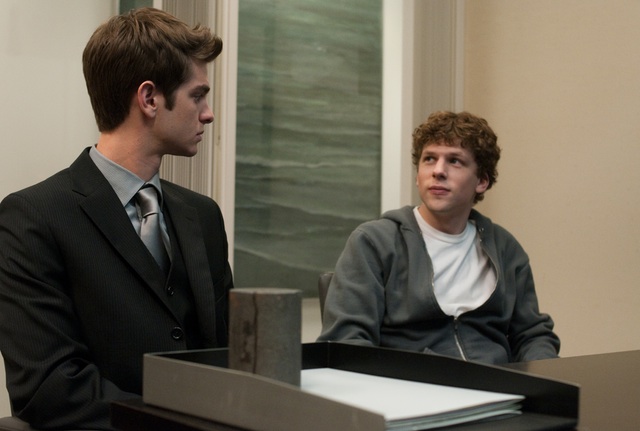"Social Network": a full review of the film from Mashable

Externally, the film “Social Network” is the story of a Facebook project — a site created at the Harvard dormitory in 2004 that predetermined how we would interact and communicate with each other in the 21st century. At its core, a film about a social network is more than just the story of a single site. Work represents a view from all sides on the success, failure and manifestations of pride and greed.
The film seems to be based on real events with the participation of real people. They say many stories and characters were invented specifically for the project. In the coming weeks there will be a lot of discussion about how accurately or inaccurately the film reflects the first year of Facebook. Although, ultimately, these differences and inaccuracies are not so important.
In any case, the cinematic version of the history of Facebook will reflect the accumulated knowledge, like the Pirates of Silicon Valley, reflecting the unofficial history of Microsoft and Apple for a generation of users. From a cinematic point of view, the movie "Social Network" does not display accurate facts. It is a fictional story.
')
Start
The film begins with one of the significant scenes in which nineteen-year-old Mark Zuckerberg talks to his girlfriend. Zuckerberg, who was brilliantly played by Jesse Eisenberg, speaks very quickly, constantly changing topics, to which his companion exclaims “Dating you is like a meeting with an escalator.”
During a conversation, Zuckerberg, unwittingly, insults his girlfriend, downplaying her mental abilities and future prospects. After hearing enough, she decides to break their relationship and begins to chastise him. The dialogue in this scene, to the delight of fans of producer Aaron Sorkin, recalls the best moments of the series "The Wing of the West" or "Night of Sports."

This scene is one of the key Sorkin contributed to the script. It is partly taken from Ben Mezrich's Random Billionaires book. In it, the audience is introduced to Mark, a wonderful guy, who, however, is not very confident, clumsy and closed.
In the book, the author explains the motive for creating a project that precedes Facebook, called Facemash. Facemash is a project for Harvard students (and those who are angry at all women after breaking up), based on the principle of Hot or Not (dating service, where you can not only meet new interesting people, but also give marks based on user photos systems (from 1 to 10 points). Having created this project, Mark hacks into the university network, in connection with which he has problems with the administration, after which he is expelled from the campus. After the incident on Mark, two beautiful, sporting and privileged bathroom twin Cameron and Tyler Winklevoss Twins.
The twins, whose role was played by the actor Ermi Hummer, with comrade Divya Narendra are carrying out the idea of creating a social network of dating for Harvard residents. They offer Mark to work on the code. Mark readily agrees.
The idea of creating a dating site leads Mark to a more serious one - the creation of Facebook becomes this idea. Cooperating with his best friend - financier Eduardo Saverin, played by Andrew Garfield, Mark creates Facebook. The project, like a virus, is distributed online, involving an increasing number of users.
Those of us who signed up for Facebook in the early days of its existence (I think I joined in January 2005), could observe the rapid development of the project’s capabilities. One of the interesting features of Facebook, a site that initially attracted its prestige, based on its exclusivity (it was necessary to have an e-mail on the edu domain from schools that support it, and a special invitation from another user) was its rapid spread. Like the YouTube project, which appeared a year later, Facebook went in a very short period of time from an unknown site to a project that almost everyone knows about.
Like his character, Jesse Eisenberg is inimitable. I expect to see his name among the nominees for the title of best actor when the time comes to award awards. He succeeds in making the audience sympathize with the protagonist, but not feeling sorry for him is really a big difference. Mark could play a pathetic, unsociable genius. Eisenberg did not do that. The actor has managed to play a multi-faceted person, although we only see the sorrowful image once, namely in the last 5 minutes of the film. The way he says his look, gait, and body movement are truly one of the best performances in 2010.
Second action
As the story unfolds, the film’s accents change. Many changes are currently taking place where Zuckerberg, Saverin and the Winklevoss twins make allegations about various lawsuits related to owning the Facebook project.
Like the movie “Zodiac,” filmed by David Fincher in 2007, these legal procedures are used in the Social Network script. Structurally, this is an interesting device that is well suited for this particular story.
It is known that director Fincher uses subtle colors and shades in his works (starting with the Fight Club and ending with the Mysterious History of Benjamin Button). Color - one of the most striking distinguishing features of the works of Fincher. On the Social Network, he uses light color combinations for each character. They are barely distinguishable, but have an impact on perception.

The second and third actions mainly describe the significant rise of the Facebook project and at the same time the deterioration of friendly relations between Mark and Eduardo. The actor Andrew Garfield especially managed to arouse the sympathy of the viewer. He is the most native character, but you cannot say that he is a hero. On the contrary, despite the fact that he, excluded from one of the largest companies of the last decade, evokes sympathy, it becomes clear that if Eduardo Saverin was in charge of Facebook, the project would not be what it is today.
However, not all the laurels got Zuckerberg. Sean Parker, founder of the Napster peer-to-peer file sharing network, whose role was played by Justin Timberlake, helped Facebook bring in money. Timberlake is a very talented vocalist, and his solo career is much richer than his acting one. But despite this, playing the role of Parker, a play-boy who has many connections and values Facebook as the next Napster (with cultural changes), Timberlake is charming, reliable and believable.
Timberlake played a good role, but nevertheless his character seems to be more than just a movie hero. His main task is to encourage Zuckerberg to go to Palo Alto in the summer of 2004. This summer, Facebook made another breakthrough and was on the verge of acquiring great popularity. After this summer, it was clear that Facebook was on its way to rampant success.
The film ends suddenly, which is not entirely expected, but this does not contradict its main theme. This story is about the first year of Facebook. The story has evolved, but at the stage when the film ended, Facebook was still the network for the college, it had no apps, it had not yet overtaken MySpace. In fact, the film ends at a stage from which the rest could only begin.
Total
An indisputable fact is that by May 2005, a year and a couple of months after the foundation of www.facebook.com , 2.8 million users had already registered in the project, $ 13 million had been received. After 6 years, the site has ceased to be college-oriented; the project was rapidly transformed, and more and more people from all over the world began to register there.
I'm not sure if Facebook can be called the next Google, but it definitely contains the spirit of the age of the computer and communications era. It is impossible to challenge the fact that Facebook will have a strong impact on the future.
While watching, I was struck by 2 circumstances: 1) How quickly everything happens. It seems incredible that most of the significant events in the film took place over a year and a half. 2) I remembered again how young we were in the first days of Facebook.

I continue to reflect on these circumstances, because I think they are reflected in history. Externally, this is a story about greed, selfishness, and how money and fame change people. And all this is true. However, in a broader sense, I think this is also a story about what happens when success literally overnight falls on people who have not even finished college. How can this not change them? How can it not affect relationships and loyalty?
Grand success and the ability to change the world have their price. Often this price is friendship. This is true both for sellers of all kinds of trinkets, and for the creators of social networks.
This idea is underlined by the skillfully selected subtitle for the film: “It’s impossible to acquire 500 million friends without acquiring at least a couple of enemies”.
Movie info , @gefix prompted
Source: https://habr.com/ru/post/105504/
All Articles